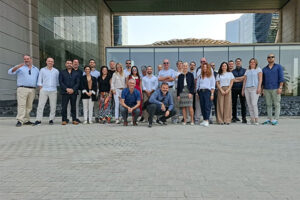By Jörg Wege
Sustainability is and will remain a game changer in the retail real estate industry. In the whirlwind of the coronavirus crisis, sustainability, or ESG (Environment Social Governance), has seemingly fallen off the radar in many places, even though it is the benchmark for sustainable economic activity. The demands imposed by politicians, society, investment companies, and retailers, none of which are entirely new, should be seen by the industry as a wake-up call to ensure that centers and other retail properties are fit for the future – to the benefit of the environment, the economy, and society. How can such a complex task be accomplished?
Based on the sustainability goals of investors, the ball, in terms of implementation, is in the court of retail property operators and their partners, such as facility management (FM) providers and retailers. The task, which must be carried out in close cooperation with asset management, is to develop and implement an individual strategy for each property. In order to achieve that, not only do operators and FM service providers have to be familiar with the measures that can be taken to measure and reduce CO2 emissions, but they also have to know how consumption can be reduced in other areas (water, cleaning agents, etc.).
Supporting the mobility revolution via charging infrastructure for electronic vehicles is a good area of focus for retail properties – and it demonstrates just how complex the task truly is. There are a number of charging infrastructure providers, but which ones understand retail properties and can offer them additional benefits beyond charging infrastructure and fair leasing rates for the owners? Many property owners allow themselves to be swayed by the free installation and operation of charging infrastructure, which is often coupled with minimal leasing rates. However, very few offer fair leasing models that allow owners to participate in the expected boom. Do charging infrastructure operators who actively promote retail properties through added values, such as active customer loyalty, actually exist? Indeed, they do – one just has to know who they are.
Refurbishments are another key factor for successful ESG. Building and planning laws only support ESG when it allows for appropriate evolutionary development through flexibility. Of course, sustainable center management measures for CO2 reduction and ecological waste management must be planned and implemented. However, refurbishments also offer opportunities to implement social aspects. One such example can be found in the outdoor area of Decathlon in the newly revitalized T.E.C. Erfurt, which serves as a free training and playing ground for local residents for a wide variety of sports, such as basketball, soccer, and handball. Retail properties have always been more than just supply sites – they are meeting places for the general public.
Governance is already more widespread at the measure level, for example, through fund specifications for bidding amounts, procurement guidelines, and compliance. However, governance can and should do more. Making the incentivization of fund and asset managers, for example, contingent upon the achievement of certain environmental benchmarks would effectively align all links in the management chain to ESG implementation.
In order for ESG projects to truly take flight, given their high level of complexity, interdisciplinary management teams and cross-company networks are necessary. After all, sustainable retail properties are always team projects – undertaken by communities and geared toward the greater good. The ball has long been in the game. Let’s play!





